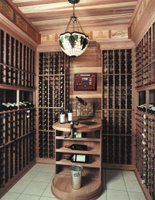Grape Juice, Wine, and Holy Communion
 Q: Some congregations use grape juice for Communion, using Proverbs 23:31 to defend the practice: “Do not look at wine when it is red, when it sparkles in the cup and goes down smoothly.” Their argument continues, “The word when is a time reference, meaning that there is a time when the wine is not red, but purple, as in grape juice. The word wine can then be denoted as wine that is not red; i.e. grape juice. If that is the case, we can then use grape juice for the Sacrament of the Altar, since the element is to be wine which can be either wine or grape juice.” Can you please address this argument?
Q: Some congregations use grape juice for Communion, using Proverbs 23:31 to defend the practice: “Do not look at wine when it is red, when it sparkles in the cup and goes down smoothly.” Their argument continues, “The word when is a time reference, meaning that there is a time when the wine is not red, but purple, as in grape juice. The word wine can then be denoted as wine that is not red; i.e. grape juice. If that is the case, we can then use grape juice for the Sacrament of the Altar, since the element is to be wine which can be either wine or grape juice.” Can you please address this argument?A: While their argument could be made from this passage alone, let’s see how the word translated “when” means much more in Hebrew. Translators may render it as “for” or “because,” as in, “Give thanks to the Lord for he is good, for his steadfast love endures forever. (Psalm 106:1, et al.)” Other translations include “if”, “in case,” “even when,” “even though,” “as,” “which is,” “who is,” and the like. Even the use of “when” isn’t strictly temporal. In English, we may use it to indicate a general state of being, independent of time.
 Secondly, nothing in Scripture (or science) indicates a lack of alcohol in either red or purple wines. Except among prohibitionists, theologians generally agree that whatever the exact color, “wine,” “new wine,” “old wine,” “mixed wine,” and “fruit of the vine” all refer to the end product of grape fermentation; that is, wine. Differing types may have varied in strength but all contained alcohol.
Secondly, nothing in Scripture (or science) indicates a lack of alcohol in either red or purple wines. Except among prohibitionists, theologians generally agree that whatever the exact color, “wine,” “new wine,” “old wine,” “mixed wine,” and “fruit of the vine” all refer to the end product of grape fermentation; that is, wine. Differing types may have varied in strength but all contained alcohol.If we examine the surrounding verses, from 29 through 35 we read an entire section indicting drunkenness and the intentional abuse of alcohol. The rhetorical questions in verse 29 beg the answers that follow. What causes all these problems? Not wine, but too much wine, taken too often. The final lines obviously aren’t spoken by a responsible social or religious consumer — they sound exactly like alcohol and drug addicts of our current age: “When shall I awake? I must have another drink.” Only “real” wine taken too frequently or at too great a volume will leave one drunk and then hung over.
I would say the intent of the verse is, “Don’t gaze longingly over cup of sparkling red wine, lest it gently seduce and then harshly ensnare you.” And if wine seduces and ensnares anyone drinking of the cup of the blood of Jesus Christ, he has problems beyond any interpretation of this verse.
Previous posts touching on this topic include Communion Practices and Two Wines? Too Much!
Scripture quoted from The Holy Bible, English Standard Version™, © 2001 by Crossway Bibles.
Send email to Ask the Pastor.
Walter Snyder is the pastor of Holy Cross Lutheran Church, Emma, Missouri and coauthor of the book What Do Lutherans Believe.
Technorati Tags: Holy Communion | Lord’s Supper | Communion | Eucharist | wine | new wine | old wine | mixed wine | red wine | purple wine | fruit of the vine | grapes | grape juice | theology | systematic theology | dogmatics | sacramental theology | exegetical theology | exegesis | practical theology | Pastor Walter P. Snyder | Walter Snyder | Ask the Pastor
Newspaper column #535:2

1 Comments:
One needs to read the verse in context. It is a warning against drunkenness.
Anyone can pull a verse and say it says one thing when in context, it doesn't.
Post a Comment
<< Home